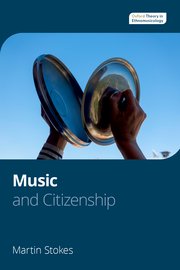 Martin Stokes, Music and Citizenship, Oxford University Press, 2023
Martin Stokes, Music and Citizenship, Oxford University Press, 2023
Critical citizenship practices and the language of today’s populism have never been more sharply opposed. Today’s insistent efforts to anchor citizenship narratives in national belonging now confront a variety of ‘flexible’ or ‘differentiated’ citizenships – plural, performative, and decentered practices of rights claiming mutually defining ‘the political’, its subjects, and its others on a variety of scales. They confront, too, critiques of citizenship in totalitarian or neoliberal governmentality that derive from Foucault, Agamben, and Arendt and have become pressing today in proliferating states of emergency and exception and the growing ranks of non-citizens. How should these debates be configured now? And what place does music have in them?
In Music and Citizenship, author Martin Stokes argues that music has for a long time been entangled with debates about citizenship and citizenly identities, though for various reasons this entanglement has been insufficiently recognized. Citizenship and citizenly identity debates, for their part, have important implications for the way we think about music in relation to politics, identity, and scholarly practice. Stokes’s particular claim is that ethnomusicology has for too long configured relationships between music, society, and reflective and critical practice in terms of identity paradigms. The rejection of these identity paradigms in recent years has taken the form of a post- or anti-humanism that is equally problematic. This book challenges the conventional understanding of citizenship in terms of nationalism and national identity though the examination of case studies from across Latin America, Africa, Asia, and Europe.
In this way, this volume departs from an earlier ethnomusicology preoccupied with belonging and cultural participation in the nation-state. Citizenship-the fantasy, according to some definitions, of political community without outsiders-suggests, in this book, a different space in which one might configure such relations, one more satisfactorily, and energetically, oriented to questions about musical ecology, sustainability, democracy, and inclusivity.
- Offers the first comprehensive review of the relationship between citizenship and ethnomusicology
- Presents a new understanding of music and politics in the context of today’s debates about political belonging in an age of authoritarianism, failed states, and climate emergency
- Features case studies based on new research of music and political crises in Egypt, Turkey, and United Kingdom

mf is a character in
https://www.fernandaeberstadt.com/the-books/bite-your-friends
LikeLike